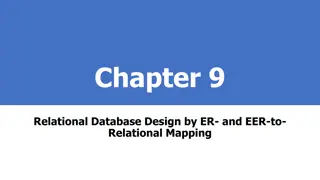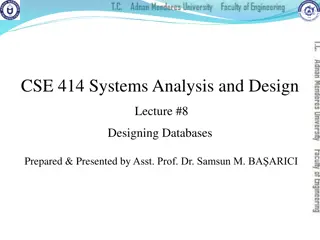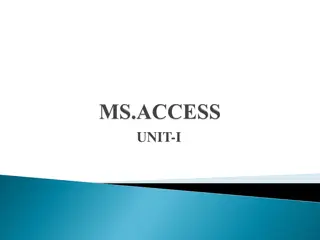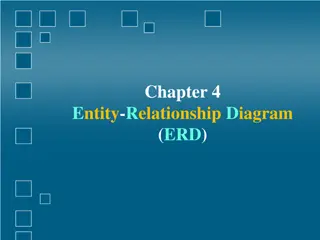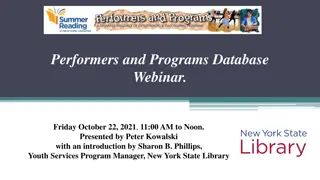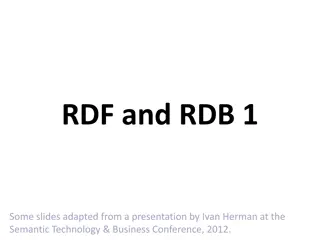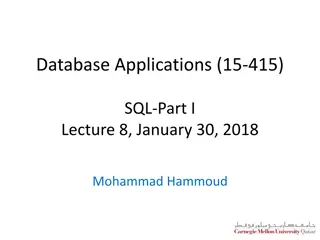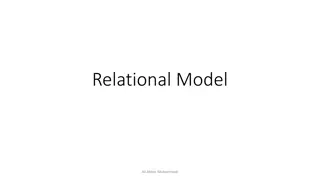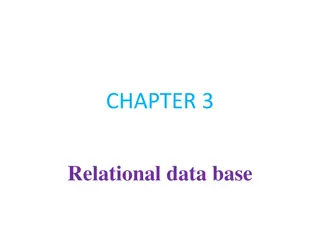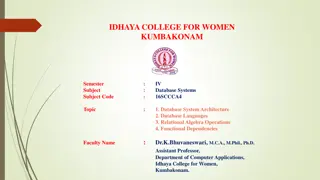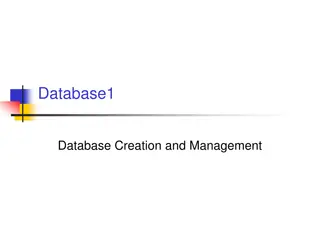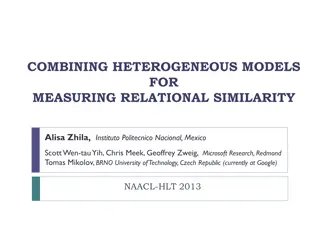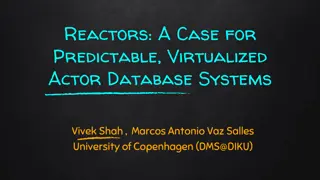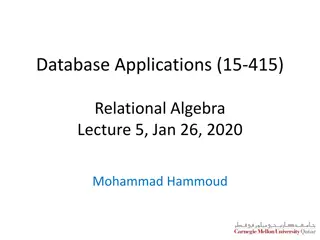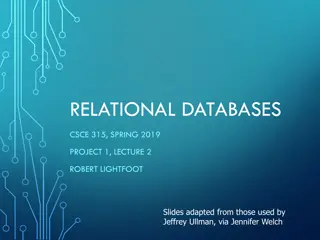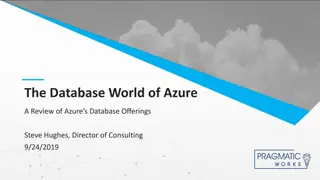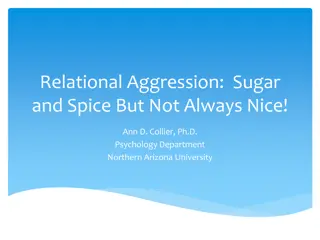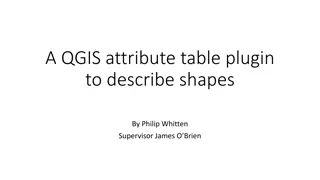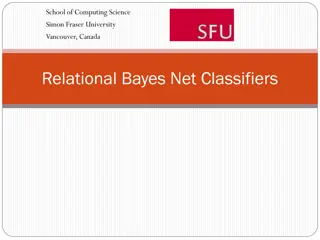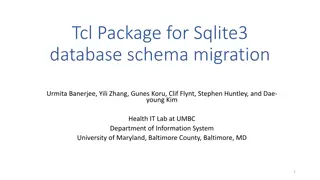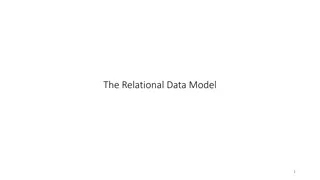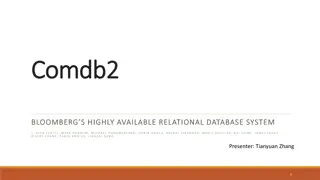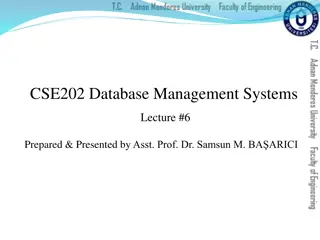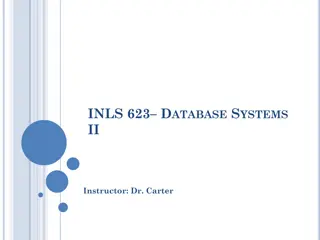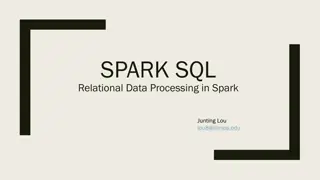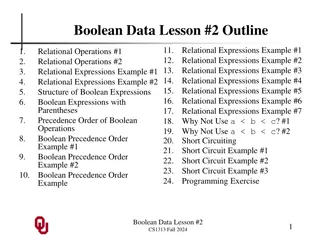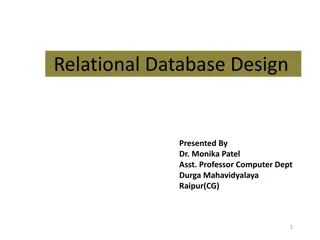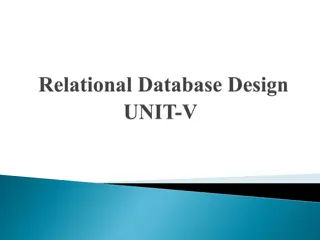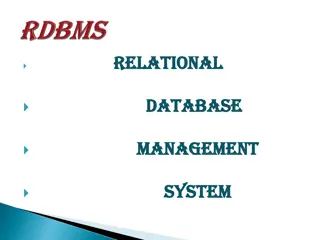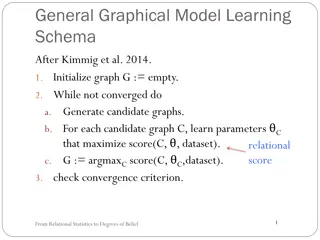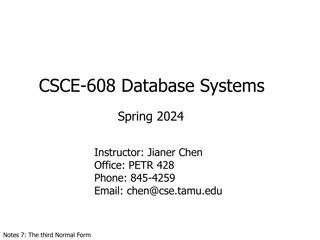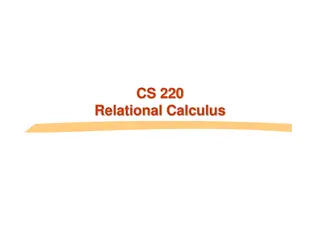Progressive Approach to Relational Entity Resolution
In this research paper authored by Yasser Altowim, Dmitri Kalashnikov, and Sharad Mehrotra, a progressive approach to relational entity resolution is presented. The study focuses on balancing cost and quality in entity resolution tasks for relational datasets. The goal is to develop a method that ac
1 views • 20 slides
Database System Concurrency Control and Transactions Overview
Studying relational models, SQL, database system architecture, operator implementations, data layouts, and query optimization laid the foundation for advanced topics like Concurrency Control and Recovery. Discover how transactions group related actions, ACID properties ensure data integrity, and the
0 views • 57 slides
Understanding Relational Database Design and Mapping Techniques
Explore the process of mapping Entity-Relationship (ER) and Enhanced Entity-Relationship (EER) models to relational databases. Learn about relational model concepts, mapping algorithms, and the goals and steps involved in the mapping process. Discover how to preserve information, maintain constraint
3 views • 42 slides
Database Design Process and Concepts
This lecture on designing databases covers the database design process, normalization, transforming E-R diagrams, physical database design concepts, and steps in logical database modeling. It highlights the importance of logical and physical database design in system development, providing insights
0 views • 64 slides
Microsoft Access: A Comprehensive Overview
Microsoft Access is a powerful Database Management System (DBMS) that integrates the relational Microsoft Jet Database Engine with a user-friendly graphical interface. It is a key component of the Microsoft Office suite, offering tools for database creation, data input, querying, and report generati
0 views • 18 slides
Understanding Entity-Relationship Diagrams (ERD) for Database Design
Entity-Relationship Diagrams (ERD) are vital in database design, illustrating entities and their relationships. They help in conceptualizing data models and laying the groundwork for database structures. The process involves identifying entities, defining relationships, and analyzing interactions to
0 views • 40 slides
Understanding Enduring Relational Themes in Psychotherapy
Exploring the concept of Enduring Relational Themes (ERTs) in psychotherapy, this content delves into the history of transference in Gestalt therapy, contemporary psychoanalysis perspectives, forms of transference, and Lynne Jacobs' insights. It highlights how ERTs manifest, their impact on therapy,
5 views • 9 slides
Performers and Programs Database Webinar - Overview and Features
Learn about the Performers and Programs Database Webinar happening on October 22, 2021. This webinar, presented by Peter Kowalski and introduced by Sharon B. Phillips, offers valuable information about the database's features, including how performers advertise programs, categorization, virtual prog
0 views • 25 slides
Exporting Relational Data to RDF: Strategies and Considerations
Explore the process of mapping relational data to RDF, including the choice of RDF vocabulary, defining mapping techniques, and exporting strategies. Learn about RDB systems that support RDF, direct mapping approaches, and the use of hybrid storage solutions. Discover how to bridge SPARQL and SQL fo
1 views • 13 slides
Understanding SQL: Major Aspects and Functionality in Database Applications
SQL, as a relational database language, offers Data Manipulation Language (DML) and Data Definition Language (DDL) for querying and modifying data. Additionally, SQL encompasses triggers, embedded code execution, remote database access, transaction management, and security features for efficient dat
1 views • 52 slides
Understanding the Key Concepts of Relational Databases
Introduction to the fundamental concepts of relational databases including the relational model proposed by Edgar F. Codd, relation schemes, relation instances, keys for a relation, and more. Discover the significance of keys, candidate keys, superkeys, and primary keys in database design.
0 views • 27 slides
Understanding Relational Databases and File-Based Systems
This chapter delves into the fundamental concepts of databases, comparing them to file-based systems, and highlighting the significance of relational databases in modern integrated AISs. It explores the difference between logical and physical views of databases, introduces key concepts such as DBMS
0 views • 70 slides
Overview of Database Systems Architecture and Languages
A database system is essential for storing and managing an organization's data. The architecture includes components like file manager, database manager, and query processor. Additionally, DML and DDL compilers play crucial roles in handling data manipulation and definition tasks. Various data struc
2 views • 28 slides
Understanding Database Management Systems and Concepts
Explore the world of databases with topics ranging from Database Creation and Management to Basic Database Terms. Learn about the significance of data, information, and metadata in decision-making processes. Discover the purpose of database systems and the role of Database Management Systems (DBMS)
0 views • 25 slides
Enhancing Relational Similarity Measurements: A Model Combination Approach
This study explores combining heterogeneous models for measuring relational similarity, showcasing the importance of general relational similarity models. It discusses the degrees of relational similarity and introduces a directional similarity model that outperforms previous systems. The approach l
0 views • 23 slides
Reactor: A Case for Predictable, Virtualized Actor Database Systems
Exploring the integration of actor programming models in modern relational databases to achieve high performance. The focus is on addressing challenges related to stored procedures, data partitioning, modularity, isolation, software engineering, and performance. The talk outlines motivation, the rel
0 views • 41 slides
Understanding Relational Query Languages in Database Applications
In this lecture, Mohammad Hammoud discusses the importance of relational query languages (QLs) in manipulating and retrieving data in databases. He covers the strong formal foundation of QLs, their distinction from programming languages, and their effectiveness for accessing large datasets. The sess
0 views • 39 slides
Challenges and Innovations in Relational Engine Algorithms
Exploring the complexity of processing graph data in relational query engines, this content delves into the challenges faced, practices adopted in academia, and innovative solutions like LMS-NPRR, trie join, and specialized data structures. It discusses the difficulties in handling acyclic vs. cycli
0 views • 27 slides
Understanding Database Basics for ASP.NET Development
Explore the fundamentals of databases, SQL usage, database relationships, and available tools for managing database objects in ASP.NET projects. Learn about relational databases, popular database options like Microsoft SQL Server, and setting up SQL Express for local development.
0 views • 27 slides
Understanding Relational Evangelism and Sharing Your Faith Testimony
Discover the essence of relational evangelism and effectively articulating your testimony of faith. Explore the significance of the Gospel message and different evangelistic approaches while delving into the concept of personal evangelism without imposition. Embrace the idea of faith arising in vari
0 views • 32 slides
Fundamentals of Relational Databases in CSCE 315 - Lecture Highlights
Introduction to relational databases covering topics such as relational data model, schemas, converting from entity-relationship model, entity sets, relations, relationships, combining relations, and practical examples. Learn about storing data in tables, attributes, database organization, and the i
1 views • 18 slides
The World of Azure Database Offerings
Exploring Azure's database offerings including Azure Cosmos DB and Azure SQL Database. Azure Cosmos DB provides a globally scalable document database solution, while Azure SQL Database is a great option for SQL Server workloads. Both platforms offer unique features such as low latency, scalability,
0 views • 15 slides
Understanding Relational Aggression in Girls: The Impact on Social Relationships
Relational aggression, a form of social bullying, can have detrimental effects on girls' social relationships and self-esteem. This type of indirect aggression includes behaviors like exclusion, spreading rumors, and social manipulation. Understanding and assessing relational aggression is crucial f
0 views • 22 slides
Enhancing Spatial Data Analysis in QGIS
Explore the integration of relational databases with QGIS to facilitate efficient spatial data analysis. Discover the importance of recognizing spatial relationships within data sets and the solutions to enhance QGIS for relational datasets. Overcome challenges and delve into the intersection and su
0 views • 25 slides
Understanding Relational Bayesian Networks in Statistical Inference
Relational Bayesian networks play a crucial role in predicting ground facts and frequencies in complex relational data. Through first-order and ground probabilities, these networks provide insights into individual cases and categories. Learning Bayesian networks for such data involves exploring diff
0 views • 46 slides
Tcl Package for SQLite3 Database Schema Migration
A Tcl package was developed to support schema migration in SQLite3 databases, enabling incremental or reversal changes to relational database schemas. The package includes functions for fundamental database operations like table creation, deletion, column addition, removal, and table renaming. By ge
0 views • 15 slides
Understanding the Relational Data Model and Database Concepts
Delve into the world of relational data modeling, database integrity rules, and structure. Explore how a university database in MS Access utilizes relational tables and fields to store information. Learn about the key terminology associated with relational databases, such as primary keys, foreign ke
0 views • 69 slides
Highly Available Relational Database System - Key Components and Design Choices
A comprehensive overview of a highly available relational database system, focusing on scalability, concurrency control options, data replication, availability strategies, failure handling, and full transactional support. The content discusses essential elements such as optimistic concurrency contro
0 views • 21 slides
Women's Self-Esteem and Relationship Behavior Study: Insights and Implications
This study explores the relationship between women's self-esteem, relational behavior, and perceptions of relational desirability. Findings indicate that self-esteem does not significantly predict relational behavior, with women feeling less desirable than their partners reported investing more in r
0 views • 9 slides
Object-Oriented Database Concepts and Limitations in Relational Models
Object-oriented database concepts are introduced as an alternative to relational models, addressing limitations such as lack of support for complex data structures, generalization, specialization, and aggregation. The shift towards a more data-centric approach in information systems development is d
1 views • 82 slides
Understanding Relational Child and Adolescent Psychotherapy
Explore the concepts of relational child and adolescent psychotherapy involving attachment patterns, intersubjectivity, corrective emotional experiences, and the role of the relational psychodynamic psychotherapist in providing corrective emotional experiences essential for the child's development.
0 views • 25 slides
Understanding Relational Database Management Systems
Dive into the world of database systems with a focus on relational structures, entities, properties, and relationships. Explore the types of database systems, the representation of entities in tables, and the constraints and types of relationships that govern data connectivity. Gain insights into or
0 views • 17 slides
Overview of Spark SQL: A Revolutionary Approach to Relational Data Processing
Spark SQL revolutionized relational data processing by tightly integrating relational and procedural paradigms through its declarative DataFrame API. It introduced the Catalyst optimizer, making it easier to add data sources and optimization rules. Previous attempts with MapReduce, Pig, Hive, and Dr
0 views • 29 slides
Understanding Relational Operations for Boolean Expressions
Learn about relational operations in Boolean expressions through examples and explanations. Discover how to compare numeric operands to produce Boolean results, covering equal to, not equal to, less than, less than or equal to, greater than, and greater than or equal to operations. The content inclu
0 views • 25 slides
Understanding Relational Database Design Fundamentals
This content delves into the crucial aspects of relational database design, including normalization, pitfalls, RDBMS design issues, and the overall database design process. It emphasizes the need for well-structured relation schemas to minimize redundancy, ensure data integrity, and facilitate effic
1 views • 53 slides
Understanding Relational Database Design Principles
Explore the features of good relational design, including atomic domains and first normal form decomposition. Learn about functional dependency theory, algorithms, and database design processes. Discover the importance of atomicity in domain design and the implications of non-atomic values. Gain ins
1 views • 71 slides
Evolution of Database Management Systems
The evolution of Database Management Systems (DBMS) began with file systems and punched cards in the 1950s, followed by hierarchical and network models in the 1960s and 1970s. The 1980s introduced relational databases like Ingres, Oracle, DB2, and Sybase. The 1990s saw the rise of object-oriented an
0 views • 31 slides
Learning Bayesian Network Models from Complex Relational Data
Delve into the process of learning Bayesian network models from complex relational data, extending traditional algorithms to suit relational data structures. Explore key concepts like likelihood functions, graphical model initialization, and parameter learning for effective model fitting.
0 views • 20 slides
Understanding Database Normalization and BCNF in Database Systems
Learn about the process of database development, including E-R diagrams, converting to relations, developing database operations, normalization, and BCNF. Explore algorithms for achieving BCNF and example scenarios to understand key concepts in database systems.
0 views • 43 slides
Introduction to Relational Calculus and Algebra in Database Management
Explore the fundamental concepts of relational calculus and algebra in the domain of database management. Understand the differences between declarative and imperative query languages and learn to retrieve information using practical examples and theoretical frameworks such as tuple relational calcu
0 views • 23 slides


